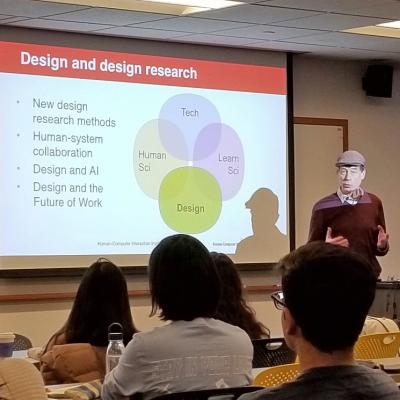Carnegie Mellon Launches New Undergraduate Degree in Human-Computer Interaction

HCI Major Addresses Growing Demand for Expertise in Technology and Design
Carnegie Mellon University's School of Computer Science (SCS) will offer a new undergraduate degree in human-computer interaction (HCI) beginning this fall. Among the first of its kind in the nation, the program will produce HCI specialists with a strong foundational knowledge of computer science and wide-ranging skill in developing digital technologies that solve problems and benefit humans.
"We'll be training individuals poised to innovate at the intersection of people and technology, with the goal of making the world a better place," said Jodi Forlizzi, Geschke Director and professor in the Human-Computer Interaction Institute (HCII.)
The HCII is a world leader in a wide range of research areas, including innovative interaction techniques, advanced learning technologies, transformative games, accessibility, digital technologies in healthcare, sensing and fabrication, transportation and mobility, usable privacy and security, and social computing.
"The HCI field has grown tremendously, and it now seems right to view it as its own area of expertise instead of an amalgam of other disciplines," said HCII Professor Vincent Aleven.
As the use of digital technologies continues to expand beyond mobile applications and websites into conversational interfaces, the internet of things and augmented/virtual reality, there is an ever-growing demand for people with advanced technical skills who also excel at user-experience design.
"Design isn't just about getting the thing right. It's about designing the right thing and solving the right problem. You must know design and technology to come up with solutions," Aleven said. "HCI methods can help you imagine things and quickly build prototypes to test for the best solution. Undergraduates who earn this degree will have the skills to build innovative, sophisticated technologies. They will master many methods to investigate people's needs, foster the trust of the people they're designing for, ideate, and create designs and technologies that address needs and make a difference."
Students accepted into SCS can declare the HCI major in their first year, typically in the spring semester. All SCS students take first-year courses in core computer science competencies, allowing them to make informed choices when it is time to declare a major. In additional to the HCI undergraduate degree, SCS offers bachelor's degrees in computer science, artificial intelligence (launched in 2018) and computational biology (launched in 2017). Applications will be accepted from current SCS students who wish to transfer into the new degree this coming fall.
In their second year, HCI major students will take core HCI classes and electives. More technical courses will focus on learning low- and high-tech prototyping processes, while methodology courses will allow students to study humans, organizations, groups and societies to learn to evaluate the effectiveness of different technologies.
"Through elective courses, there is really room for tailoring the degree to the student's interests, whether it be digging deeper into tech, honing design skills or focusing on the human side, such as psychology or business," Aleven said.
The HCI major will also provide ample research experience for interested students, including a sequence of mentored independent work. When they graduate, students who take that path will have experienced a full cycle of research — from conception of research questions, research design and execution to presentation and publication of results, contributions and practical impact.
HCI undergraduates interested in careers in industry will be poised to grow into strategic roles that demand a broad skillset, and are likely to end up in product management positions earlier in their careers than purely technical students.
CMU has long been a leader in computer science education, offering the first university-level course in computer programming in 1958, launching the first Ph.D. program in robotics and creating the world's first Machine Learning Department. The undergraduate degree in artificial intelligence was the first of its kind in the country. Aleven said the university has also pioneered approaches to design-based research.
"If you're not just interested in nifty technology, but in making technology do the right thing in a way that helps humans, this is the degree for you," Aleven said. "We're building on CMU's strengths and its aptitude for creating interdisciplinary teams."
"I am excited to see what the inaugural year of the HCI degree holds," Forlizzi said.
For More Information

